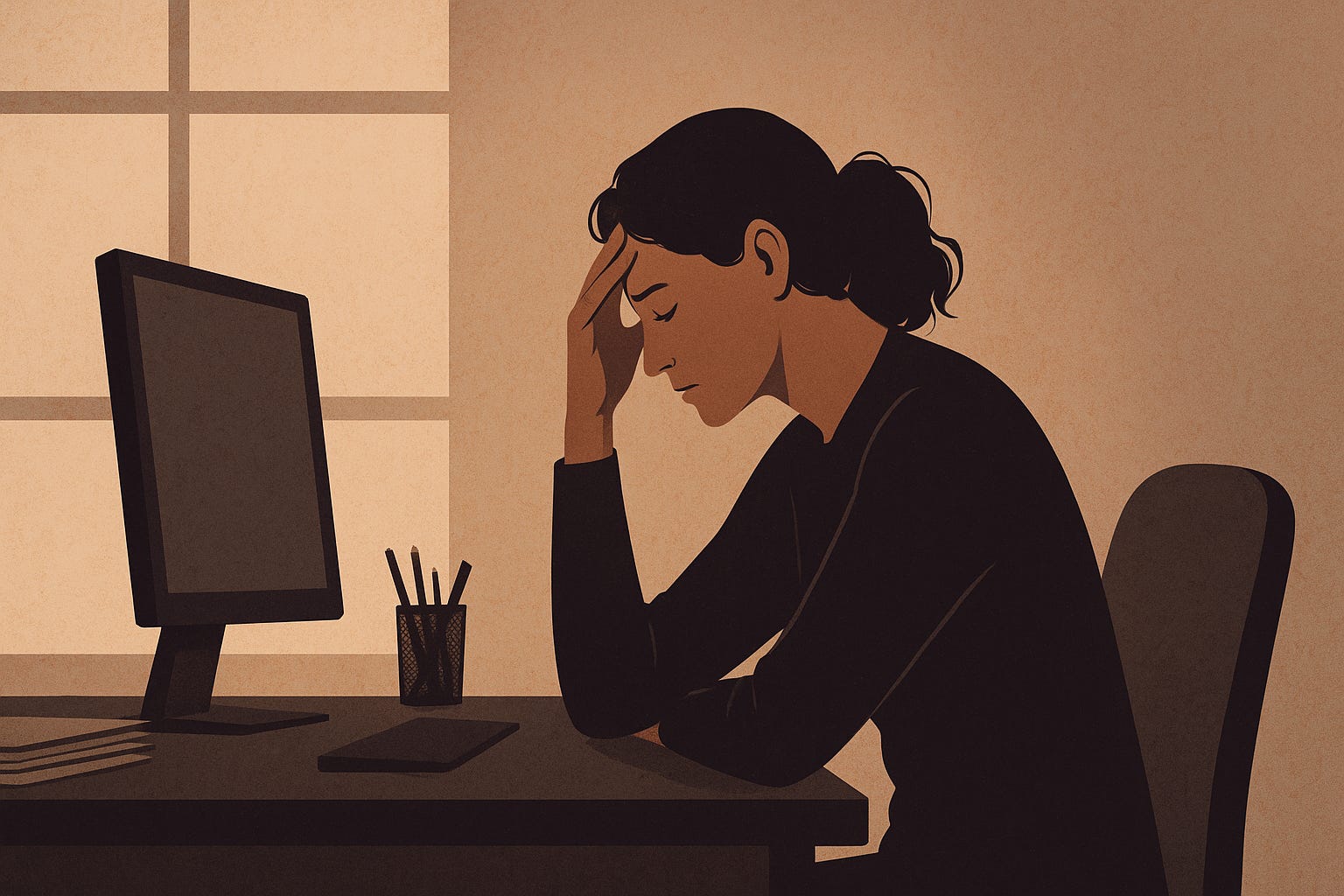Still Learning To Be The Adult I Am
Understanding why setting boundaries still feels like asking for permission
“When the tears come, you are already too late.”
That was what my manager told me when I raised a problem with him. For several weeks, I noticed that my irritation levels were high. High enough to cause stress. Stress I didn’t need as I have enough of that in my life with my husband’s health.
Much of the irritation came from the non-productivity of a colleague, partially because of computer problems, and partially because her motivation was nowhere to be seen. The combination of that meant I took on many of her tasks too. Not because anyone asked me to, but because clients waited for documents, the work needed to be done, and I always take my responsibilities seriously.
I expect a manager to be aware of this. Back when I was a manager, I always was. But that’s another story.
With the irritation increasing, the stress levels rising, I noticed I had heart palpitations. I literally felt my heart fluttering and my throat constricting. I checked a trusted medical site, and my suspicions were confirmed: it was caused by stress.
Several weeks in, I started dragging my feet to go to the office. The closer I got driving there in the morning, the more my shoes filled with lead. The last time I felt like that was before I had a burnout in 2012.
The day before I finally spoke up, my manager came to me about something my colleague had taken on. At that moment she was off from work for a two-week holiday, after being off sick for a week. I snapped. My voice raised. I went against what he said. I didn’t want to do what he wanted, but then gave in on some points, still showing every bit of my anger and irritation.
Afterward, I was ashamed. I wanted to apologize, and then again, I didn’t. That day, I never had another chance to speak to him. At home, I told my husband what happened, and he said: “Maybe it’s a good thing you got angry for a change, instead of crying.”
The next morning, I was alone with the manager, and totally unrelated, he made a remark about anger. That was when I grabbed the opportunity to talk about how fierce I had been the previous day.
I hesitated before opening my mouth. My heart beat in my throat, and part of me wanted to swallow the words — as I always did. Something in me refused to stay quiet this time.
No, I didn’t apologize because by then I felt I didn’t need to, as I hadn’t been rude to him. I explained how I felt. That my plate was more than full, and had been for months. That my colleague seemed totally disinterested. I told him about the tasks, which were hers but which I had taken over, because then at least they get done. I just threw everything out, and yes, my eyes brimmed with tears several times.
That was when he said: “When the tears come, you are already too late.”
His words landed like a stone in my chest. Too late? To late for what? To protect myself? To speak up before I crumble? I realized he was right. My breaking point always arrived quietly, disguised as competence.
In our weekly meeting later, he repeated that. I said: it is part of who I am. I don’t recognize my boundaries, and when I do, I don’t know how to not go over them.
Honestly, I quickly feel like I’m being too dramatic.
But to that statement, I added something else: It’s also because of the way I was raised.
It was only a day later that I explored that statement further.
Obviously, when I was a child, my parents were in charge. When they said something should happen, it did. When they said no, we listened, or there would be consequences.
In the moments when I dared to ask for something, the reactions frequently were negative. Not just a ‘no’, but words to put me down. Calling me stupid for wanting it. Telling me I shouldn’t always make it about myself. Making me feel inferior for wanting something.
I took those things with me.
In every relationship I entered — romantic, friendship, professional — I allowed the other party to have the power. I allowed them to be in charge.
When I got to the point where I finally dared to want something for myself, something I knew was ‘normal’ and which I deserved, I’d been thinking about it for so long and had so many scenarios in my head, that I either blurted my need out in anger, or cried when asking, deadly afraid of the reaction.
Many times in our relationship — we’ve been together for 23 years, married for 20 this year — my husband had said that he didn’t understand why I couldn’t just say or do what I wanted, that I didn’t need his permission. I couldn’t explain it to him because I didn’t understand it myself.
However, I am gradually starting to understand. I’m 58, going on 59, and I’m still learning about the consequences of my upbringing. I’m better with this than I was years ago, but there’s still much room for improvement. Like another colleague — we’d been working together for 13 years already — said in that meeting: “By the time you retire, you will get it right.”
I have nine years and seven months to work until I can retire, but I sure hope it wouldn’t take all that time for me to finally feel comfortable to be the adult I am, to honor my boundaries, to do things I want without feeling I need to ask for permission, and to say no to things I am not responsible for.
Maybe growing up means learning that being “too much” or “too sensitive” were never flaws at all — just early warning signs I learned to ignore.
I’m a work in progress, but I will get there!
Also read this wonderful essay by
The Lessons My Second Marriage Taught Me About My First
A memory burns in my mind as fiercely as all the others that reek of suffering. I wonder why my brain clings to the ugly so much tighter than the beautiful, like braille pres…



